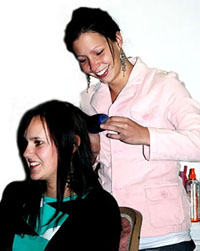Steel Magnolias
By: Robert Harling
Director: Elizna Pieters
 With: Eileen van der Merwe, Nicole Smit, Nastacia de Klerk, Jenette Vivier, Isabel Mostert, Ilse Hancke
With: Eileen van der Merwe, Nicole Smit, Nastacia de Klerk, Jenette Vivier, Isabel Mostert, Ilse Hancke
Steel Magnolias is a must-see production soon to be performed by drama students in their second year at the University of the Free State. It is directed by Elizna Pieters, currently doing her B.A. Drama and Theatre Arts (Hons) in directing.
The action is set in Truvy's beauty salon in Chinquapin, Louisiana, where all the ladies who are "anybody" come to have their hair done. Helped by her eager new assistant, Annelle (who is not sure whether or not she is still married), the outspoken, wise-cracking Truvy dispenses shampoos and free advice to the town's rich curmudgeon: Ouiser ("I'm not crazy, I've just been in a bad mood for forty years"), an eccentric millionaire; Miss Clairee, who has a raging sweet tooth; and the local social leader, M'Lynn, whose daughter, Shelby (the prettiest girl in town), is about to marry a "good ole boy”.
Although filled with hilarious repartee and verbal collisions, the play moves toward tragedy when the spunky Shelby, a diabetic, risks pregnancy. Soon the women realize that they share everything, from the shampoo and gossip right down to love, loss and an underlying strength. This gives the play and its characters, the special quality to make them truly touching, funny and marvelously amiable company in good times and bad.
Steel Magnolias can be seen at the Scaena Theatre on the UFS campus, on 11 and 13 September 2007 (English Production).
Ysterasters is te sien in die Sceana Teater (UV-kampus) op 12 en 14 September. (Afrikaanse Produksie)
Reservations / Tickets: Department Drama and Theatre Arts
Emmie van Wyk - +27 51 401 2160